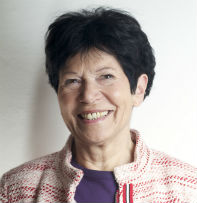Helga Nowotny

ENG. Helga Nowotny is Professor emerita of ETH Zurich and Former President of the European Research Council. She is Chair of the ERA Council Forum Austria and Member of the Austrian Council as well as Visiting Professor at Nanyang Technological University, Singapore. Among other she is a member of the Board of Trustees of the Walling Falls Foundation, Berlin; Vice-Chair of the Lindau Nobel Laureate Meetings and Chair of the Scientific Advisory Board of the Complexity Science Hub, Vienna. Her latest publications are "The Cunning of Uncertainty“ (2015) and “An Orderly Mess“ (forthcoming)
ITA. Helga Nowotny è Professore Emerito dell'ETH Zurigo ed ex Presidente del Consiglio Europeo della Ricerca. È Presidente dell'ERA Council Forum Austria, membro dell'Austrian Council e Visiting Professor alla Nanyang Technological University di Singapore. Inoltre è membro del Consiglio di Fondazione della Walling Falls Foundation di Berlino, Vice Presidente dei Lindau Nobel Laureate Meetings e Presidente della Commissione Scientifica del Complexity Science Hub di Vienna. I suoi libri più recenti sono "The Cunning of Uncertainty“ (2015) e "An Orderly Mess" (in corso di pubblicazione).
Navigating Uncertainty – bridging the gulf between science and society
ENG. The recent waves of fake news and the alleged entrance into a new post-factual era raise questions that are of direct concern to science and scientists. They also present an opportunity to reassess what might have gone wrong and what can – and should – be done to bridge the apparently widening gulf between ‚science’ and ‚society’. Neither a purely defensive attitude where science has all ‚the facts’ nor a somewhat naive
call for more communication with society will prove to be satisfactory. Instead,
I will focus on the different ways in which ‚science’ and ‚society’ cope with uncertainty. While a craving for certainty in society (and among politicians) is widespread, uncertainty is inherent in the process of research, especially in basic research where the results are neither known or foreseeable in advance. Yet, navigating uncertainty has also become more challenging for younger researchers who find themselves under enormous pressure today. Revisiting Abram Flexner’s manifesto ‚The usefulness of useless knowledge’ written 80 years ago, I will argue for an updated understanding of exploring the unknown, i.e. the production of new knowledge and its exploitation , i.e. innovation – while navigating the uncertainties that are inherent in both.
Gestire l'incertezza: ridurre il divario tra scienza e società
ITA. Le recenti ondate di notizie false e il presunto ingresso nella nuova epoca della post-verità sollevano alcuni interrogativi che toccano da vicino la scienza e gli scienziati. Inoltre, questi fenomeni consentono di riflettere su ciò che non ha funzionato e ciò che invece si può (e si dovrebbe) fare per ridurre il divario, in apparenza sempre più profondo, tra scienza e società. In quest'ottica, non sarà sufficiente adottare un comportamento puramente difensivo in cui la scienza si impone come detentrice dei "fatti", ma nemmeno un banale richiamo a una maggiore comunicazione con la società.
Il mio intento è sottolineare i vari modi in cui scienza e società gestiscono l'incertezza. Mentre nella società (e tra i rappresentanti politici) il desiderio di certezze è estremamente diffuso, l'incertezza costituisce parte integrante della ricerca, in particolar modo per la ricerca di base, i cui risultati non sono noti né prevedibili in anticipo. E tuttavia, navigare l'incertezza rappresenta una sfida particolarmente complessa per i ricercatori più giovani, che oggi si trovano ad affrontare enormi pressioni. Attraverso una rilettura del manifesto di Abraham Flexner "L'utilità della conoscenza inutile" scritto 80 anni fa, mi esprimerò a favore di una reinterpretazione del concetto di esplorazione dell'ignoto, ovvero la produzione di nuove conoscenze e la loro applicazione (in altri termini, l'innovazione), nel tentativo di gestire le incertezze inerenti a entrambe.





